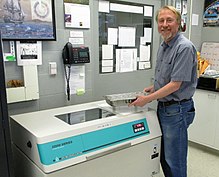Richard E. Lenski | |
|---|---|
 Richard Lenski with Long-Term Flasks and Incubator on May 26, 2016 | |
| Alma mater | University of North Carolina, Chapel Hill Oberlin College |
| Known for | E. coli long-term evolution experiment |
| Awards | NCSE Friend of Darwin Award (2017)[1] Sewall Wright Award (2012) MacArthur Fellowship (1996) Guggenheim Fellowship (1991)[2] |
| Scientific career | |
| Fields | Evolutionary biology Experimental evolution Microbiology |
| Institutions | Michigan State University University of California, Irvine |
| Thesis | Effects of competition and disturbance on ground beetle populations (1982) |
| Doctoral advisor | Nelson Hairston |
| Other academic advisors | Bruce Levin (Postdoctoral Mentor) |
| Doctoral students | Paul E. Turner Zachary Blount Michael Travisano |
| Website | lenski telliamedrevisited |
Richard E. Lenski (born 1956) is an American evolutionary biologist,[3] the John A. Hannah Distinguished Professor of Microbial Ecology at Michigan State University. He is a member of the National Academy of Sciences and a MacArthur Fellow. Lenski is best known for his still ongoing 36-year-old long-term E. coli evolution experiment, which has been instrumental in understanding the core processes of evolution, including mutation rates,[4] clonal interference,[5] antibiotic resistance,[6] the evolution of novel traits,[7] and speciation.[8] He is also well known for his pioneering work in studying evolution digitally using self-replicating organisms called Avida.
- ^ "MSU's Richard Lenski wins 2017 Friend of Darwin award".
- ^ "John Simon Guggenheim Foundation | Richard E. Lenski".
- ^ "Richard Lenski". Michigan State University. 2008. Retrieved 2008-09-17.
- ^ Tenaillon, Olivier; Barrick, Jeffrey E.; Ribeck, Noah; Deatherage, Daniel E.; Blanchard, Jeffrey L.; Dasgupta, Aurko; Wu, Gabriel C.; Wielgoss, Sébastien; Cruveiller, Stéphane (2016-08-11). "Tempo and mode of genome evolution in a 50,000-generation experiment". Nature. 536 (7615): 165–170. Bibcode:2016Natur.536..165T. doi:10.1038/nature18959. ISSN 0028-0836. PMC 4988878. PMID 27479321.
- ^ Maddamsetti, Rohan; Lenski, Richard E.; Barrick, Jeffrey E. (2015-06-01). "Adaptation, Clonal Interference, and Frequency-Dependent Interactions in a Long-Term Evolution Experiment with Escherichia coli". Genetics. 200 (2): 619–631. doi:10.1534/genetics.115.176677. ISSN 0016-6731. PMC 4492384. PMID 25911659.
- ^ Lenski, R. E. (1998-12-01). "Bacterial evolution and the cost of antibiotic resistance". International Microbiology. 1 (4): 265–270. ISSN 1139-6709. PMID 10943373.
- ^ Blount, Zachary D.; Borland, Christina Z.; Lenski, Richard E. (2008-06-10). "Historical contingency and the evolution of a key innovation in an experimental population of Escherichia coli". Proceedings of the National Academy of Sciences. 105 (23): 7899–7906. Bibcode:2008PNAS..105.7899B. doi:10.1073/pnas.0803151105. ISSN 0027-8424. PMC 2430337. PMID 18524956.
- ^ Meyer, Justin R.; Dobias, Devin T.; Medina, Sarah J.; Servilio, Lisa; Gupta, Animesh; Lenski, Richard E. (2016-11-24). "Ecological speciation of bacteriophage lambda in allopatry and sympatry". Science. 354 (6317): 1301–1304. Bibcode:2016Sci...354.1301M. doi:10.1126/science.aai8446. ISSN 0036-8075. PMID 27884940.